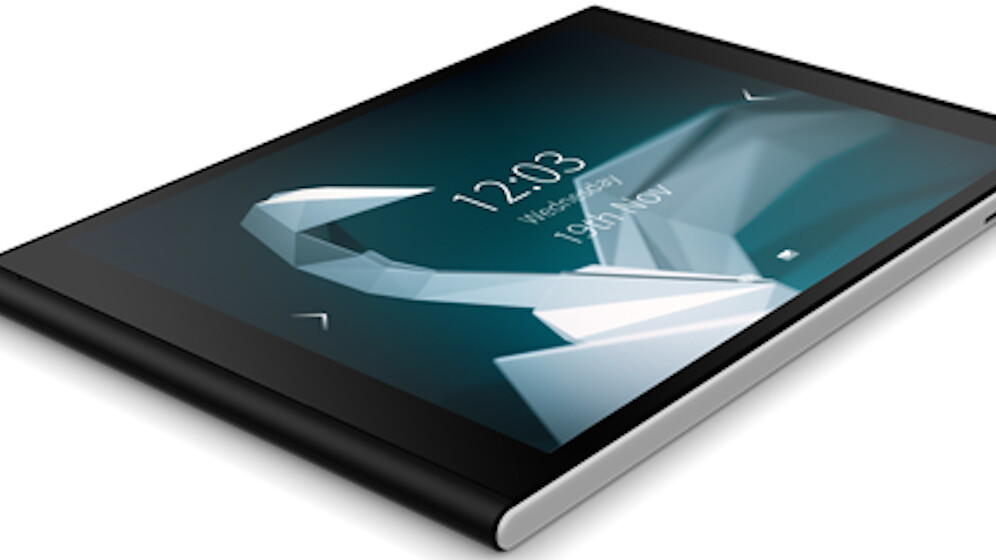
It took two days for the Jolla Tablet to break the $1 million mark on IndieGoGo and the campaign still has 17 days left to run. The crowd-funded tablet is the second product from Jolla, the company formed by a band of ex-Nokia employees who turned the MeeGo project into the open-source SailFish OS. Its first was the Jolla smartphone.
We talked to Marc Dillon, co-founder and head of software at Jolla, to get the inside track on the Jolla Tablet and what’s coming next.
“We’ve kept a roadmap hot for a long time. The way a company like ours survives and thrives is by taking these things we’re working on out on the road,” said Dillon. “One of the reasons we chose to do a tablet is to demonstrate to the world that SailFish scales to different kinds of hardware.”
He says Jolla was deliberately conservative when it kicked off the crowd funding campaign: “We tried to pick an accurate number, the number of people we wanted to see invested in the process. We didn’t want to get into all those game theories. We picked the number that made business sense for us.”
The crowd sourced tablet
The campaign’s initial goal of €380,000 – 2,000 preorders – was certainly restrained compared to the $32 million the Ubuntu Edge project tried and failed to raise via Kickstarter last year. Dillon says Jolla doesn’t think of the campaign as simply crowd funding anyway: “This is not just crowd funding, it’s crowd sourcing. We have always had a partnership with our customers.”
The company uses its Together.Jolla.com forum as a place for users and potential users to talk about what they want to see from SailFish and Jolla devices. Contributors to the IndieGoGo campaign will get even more opportunities to give input on the Jolla Tablet’s development: “People who have ordered a tablet will get a month by month, play by play updates on what’s going on.”
Beyond hitting its crowd funding target and shipping the Jolla Tablet in May 2015, Dillon says the real mark of success for the company would be “wide adoption of SailFish as an independent alternative to the other mobile operating systems and ecosystems.” He’s bullish about its potential to take on Google and Apple’s dominance of the market.
He says: “It’s not just about selling a good number of tablets, it’s about helping to break this duopoly of two companies that are dominating mobile operating systems and the mobile user experience.”
While the SailFish OS can run Android apps, Dillon believes the company can lure more and more developers to create native applications: “Having an open business model and striving for independence for our OS allows us to make different kinds of partnerships that will spur additional development.”
Over the past year, Jolla has entered a lot of new markets including Russia, India and Hong Kong. It’s even opened its first retail store in, of all places, Kazakstan.
Gunning for Google, aiming for Apple
Dillon has a harsh view of the current mobile market. He tells TNW: “Apple created a business model which is effective and focused on its strategy. It has a business model that makes it a lot of money. It teased Google out of its cloud and into this application game.
“What has happened is that Apple makes a tremendous amount of money in its area, Google makes a tremendous amount of money in its area but the rest of the mobile world – manufacturers, application developers and operators – have suffered a great deal because these guys have dominated the entire e-commerce ecosystem around mobile.”
He also believes that Android partnerships are bad for manufacturers. “If you’re a manufacturer of Android tablets, you’re directly linked to Google’s strategy which is to exploit user data for advertising revenue. When your strategy is exploiting your users, it limits certain kinds of innovation and prioritisation of what’s important.”
He believes Jolla are doing things differently: “We’re simply trying to create the best user experience and we hope that makes people want to choose our products. We’re also aiming to have an open and independent business model so if there are other companies that want to leverage our platform for hardware and software, they make money and it helps us sell more devices.”
Sailing onto your wrist
While Jolla has future versions of the tablet and smartphone on its roadmap, it could slim down SailFish to fit a much smaller screen. When we asked Dillon whether he saw a future for the OS on a smart watch, his answer was unequivocal: “Short answer? Yes. The interesting thing about e-commerce in general is that the device that’s carried around is simply a secure token. Right now, you have a wallet full of credit cards and a device in your pocket that can connect to the internet. The smart watch is something that’s even easier to carry around.”
Touching on smart watches, led him to return to his disquiet about Google and Apple’s current dominance. He continues: “The fear for the world should be that the convergence of e-commerce is going to two American companies. I think everyone should be concerned that the operating system provider of a wristwatch could become one of the world’s largest banks.
“The convergence of hardware, software, e-commerce, advertising and user data is an interesting thing. Especially when you realize there are only two companies with all of those things right now.”
It may have more than a million dollars in the bank to make the Jolla Tablet a reality but getting SailFish into third place is a much bigger challenge. Still, something tells us that Jolla might just crack it.
Read next: Hands on with Jolla’s first SailFish OS smartphone
Get the TNW newsletter
Get the most important tech news in your inbox each week.







